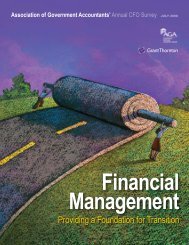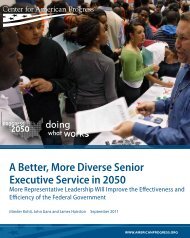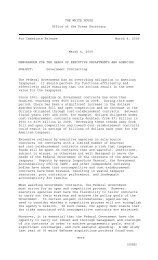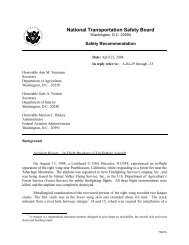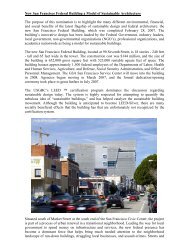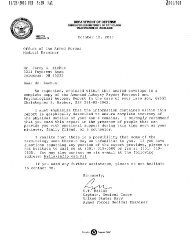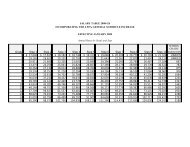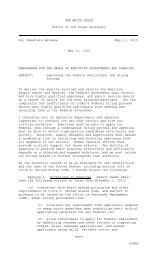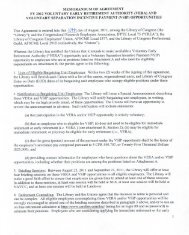Accenture's fifth annual global e-government study
Accenture's fifth annual global e-government study
Accenture's fifth annual global e-government study
You also want an ePaper? Increase the reach of your titles
YUMPU automatically turns print PDFs into web optimized ePapers that Google loves.
2004 key findings<br />
Promoting take-up is<br />
taking hold, but the<br />
challenge remains<br />
In last year’s report, we discussed how increasing<br />
take-up of online services was directly related to<br />
the value gained from an eGovernment program<br />
in terms of improved service, greater efficiency<br />
and cost savings. Clearly, the full benefits of<br />
eGovernment will be realized only if citizens and<br />
businesses use it, but most <strong>government</strong>s still find<br />
themselves confronted with the challenge of low<br />
usage and the need for innovative methods to<br />
drive take-up. In fact, our citizen survey this year<br />
showed that even among the most mature countries,<br />
take-up is less than optimal. In Canada, 41 percent<br />
of regular Internet users rarely or never have visited<br />
a <strong>government</strong> website. In the United States, that<br />
number is 48 percent.<br />
An example from the United Kingdom illustrates<br />
the significant value in moving users from offline<br />
to online services. A recent report from the UK<br />
National Audit Office revealed that 20 percent of<br />
postal applications to the UK’s Cattle Tracing System<br />
were inaccurate. The result has been that the UK<br />
Department for the Environment, Food and Rural<br />
Affairs has paid UK£9 million each year since 2000<br />
in extra staffing costs to rectify the errors. In contrast,<br />
the National Audit Office found that only<br />
1 percent of electronic requests was inaccurate.<br />
As a result, the Department for the Environment,<br />
Food and Rural Affairs has called for more electronic<br />
applications to reduce mistakes, cut the number<br />
of extra staff required to correct errors and avoid<br />
potential EU fines.<br />
While there are serious implications for driving up<br />
value for countries that do not address take-up, we<br />
find evidence that many are expending more effort<br />
in this area than in the past. A number of <strong>government</strong>s<br />
are using mechanisms for driving take-up,<br />
including promoting the use of intermediaries,<br />
providing incentives and marketing existing services.<br />
For example, in May 2003 the United Kingdom published<br />
a framework to encourage the use of privateand<br />
voluntary-sector intermediaries in eGovernment<br />
service delivery. The <strong>government</strong>’s goal is to ensure<br />
that all UK departments involve intermediaries as<br />
part of their overall eGovernment strategy. Likewise,<br />
the South African <strong>government</strong>’s stated intention is<br />
to pursue partnerships with intermediaries such as<br />
the post office network, the banking sector, community-based<br />
organizations and other private-sector<br />
organizations in all feasible situations.<br />
Some countries are providing incentives to drive<br />
usage. We saw this trend particularly among revenue<br />
services. For example, several countries, including<br />
France, Ireland and Singapore, offer an extended filing<br />
period for users of online tax filing services. In<br />
the United States, the Free File website (www.irs.gov/<br />
efile/article/0,,id=118986,00.html) allows most taxpayers<br />
to prepare and file their taxes online for free<br />
and get their refunds in half the time it would take<br />
to process their paper returns.<br />
For the past two years, our survey of citizens’ perceptions<br />
and usage of eGovernment revealed that<br />
the biggest factors for driving citizens to greater<br />
eGovernment usage are saving time and money.<br />
Numerous examples show how eGovernment services<br />
are already doing this. In Singapore, online<br />
applications for telecommunications dealer class<br />
licenses cost 20 percent less than nonelectronic<br />
applications. In Finland, a new service for domain<br />
registration (https://domain.ficora.fi) reduced<br />
application processing time from a week to a few<br />
minutes. Take-up of the service surged, with 23,000<br />
new domain applications submitted during just the<br />
first week of service.<br />
Yet, citizens and businesses will only use advantageous<br />
services if they know about them. Some leading<br />
countries thoroughly understand this point, and are<br />
making concerted efforts in marketing with some<br />
excellent results.<br />
For example, to promote www.canada.gc.ca, the<br />
Canadian <strong>government</strong> used a number of traditional<br />
marketing techniques, including a television and<br />
radio campaign, advertisements in airline magazines<br />
and newspapers and media kits available through<br />
the Canada website and gateways. Similarly, the<br />
Singaporean <strong>government</strong> introduced a number of<br />
publicity and promotional programs to improve low<br />
take-up, such as coverage by broadcast and print<br />
media; road shows and exhibitions to showcase<br />
16



